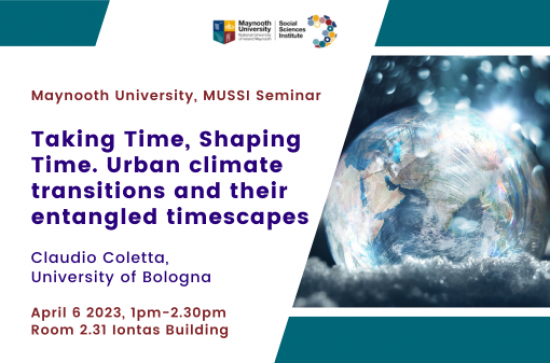
MUSSI and Professor Rob Kitchin are delighted to welcome Claudio Coletta, University of Bologna to present his paper on "Taking Time, Shaping Time. Urban climate transitions and their entangled timescapes"
In May 2021, the International Energy Agency Director Faith Birol stated that “climate change is not a race between countries, but it is a race against time”.
Indeed, climate transitions to carbon-neutral futures take time: similarly to processes of innovation, they are featured by a future-oriented work, with the adoption of mission-oriented approaches in policies and the use of modelling and simulations in climate science. As a result, long-term scenarios outline possible pathways for the next centuries while medium-term climate targets are set for next decades to pace viable transition pathways.
Climate transitions shape time, too. The long-term pathways interacts with the political cycles and the rhythms of everyday management, as well as with the temporalities silently running through infrastructural and institutional processes. Frictions between urgency and risks, hopes and delays, legacy and change turn transitions into fragile and contested timescapes, where future past and present merge, collide and are constantly reshuffled. This is increasingly evident in urban and local settings, with experimentations and initiatives bending time to make adaptation and mitigation actions durable. Moreover, the repurposing of smart urbanism apparatus towards climate adaptation and mitigation in cities introduces a further element of temporal complexity, where the deep time of the planet interacts with the real-time management and the long-term of climate policy. In the European Union, the recently started 100 Climate-Neutral Cities program and the related adoption of the Climate City Contract marks a significant step both towards the leading role of cities in addressing the climate crisis and towards the consolidation of the digital-ecological convergence.
The paper aims to present and discuss the digital-ecological timescapes of urban climate transitions from the perspective of science and technology studies (STS), based on the findings of the project “INFRATIME – Infrastructuring time in Smart Urbanism and Urban Transitions". I argue that the temporal entanglements of technoscientific practices, infrastructures, and governance in urban climate transitions offer a challenging ground to understand and address what Bruno Latour defined “the new climate regime”: a regime where not only greenhouse gases emissions should significantly decrease, but where new relations with the world should be enacted (and are enacted). I will then examine how temporalities are shaped in practice through the case of Gothenburg climate transition. I will finally outline some elements for a time-based approach to the new climate regime, as a contribution to understand the uncertain, material, and multiple existence of transitions as well as to rethink the relation between climate, society and time.
Claudio Coletta works as a Senior Assistant Professor at the Department of Philosophy and Communication Studies, University of Bologna (IT). He holds a PhD in Sociology and Social Research (University of Trento). Claudio works across the fields of Science & Technology Studies, Urban Studies and Organization Studies. In the last years, Claudio’s research investigated smart city development processes in Ireland and US, following the interplay of networked infrastructures and metropolitan-regional governance through qualitative and ethnographic approaches. Currently he coordinates the project "infratime.eu" focusing on the formation of the actual sustainable smart urbanism timescapes in European and Japanese urban settings.
Register below, please ensure to complete all fields;
*By registering for this event you also consent to your image potentially appearing in the livestream and recording. Please note that withdrawal of consent is not possible as images/video once published on the internet cannot be controlled.
